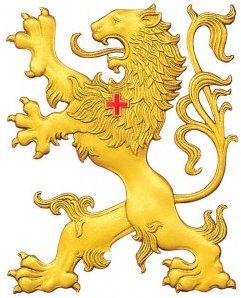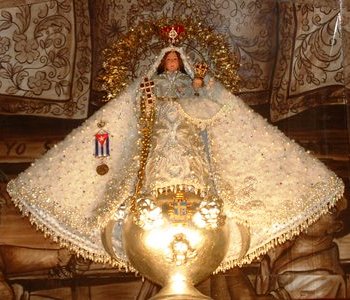Pope Francis in Cuba:
A TFP Communiqué
On the eve of Pope Francis’s arrival in Cuba, the American Society for the Defense of Tradition, Family and Property wishes to share these reflections with the American public, asking the Blessed Mother to grant the Cuban people their long-awaited freedom.
Freedom for the island-prison, or oxygen to consolidate a cruel dictatorship?
Pope Francis’ coming trip to Cuba will be the third papal visit to the island-prison. Similarly to the two previous visits, Pope John Paul II’s in 1998 and Pope Benedict XVI’s in 2012, many hypotheses are being raised on what might happen during and after the papal visit to an island that, after an amazing six decades, continues to be dominated by a cruel communist dictatorship.
Before the two previous trips, the expectation of many freedom lovers was that the papal visits would contribute not only to strengthen the rights of a subjugated Church and encourage her decimated Catholic ranks, strangled and suffocated by the regime, but would also bring a fresh breeze of freedom to the former Pearl of the Antilles.
Unfortunately, those hopes were cruelly belied by reality.
During the visit of John Paul II the world saw just how his historic appeal for the world to open up to Cuba, and for Cuba to open up to the world, was implemented. In fact, the political, economic and ecclesiastical world opened up even further to the regime, which, thus strengthened — politically, economically, and with accrued prestige in the media — kept the island-prison closed. Surprisingly, the visitor himself went so far as to praise, in a conversation with journalists, the alleged “achievements” of the regime in the fields of health and education, which, as many specialists have noted, really are instruments of ideological and moral deformation and social control of the population. Teachers and doctors are half professionals and half officials serving the Communist Party and security agencies. In short, from the standpoint of the Cuban people’s prospects for freedom, the visit was a real disaster.
From the same point of view, the trip of Benedict XVI failed to achieve better results. The interview he granted to the former dictator Fidel Castro, thus lending prestige to the Communist regime and helping bring down the psychological barriers of horror toward the Red tyrants, caused profound malaise among Cubans inside and outside the prison island.
Unfortunately, the prospects for the coming trip of the present Pontiff are no better. Pope Francis has shown himself to be a key architect of the world’s gigantic and renewed diplomatic and financial opening to the regime, including, notably, the American government itself. The dividends gained by the Cuban regime are huge and attained a climax with the media exposure of the interview the Holy Father granted dictator Raul Castro in Rome, in May 2015.
In this regard, the living legend and former political prisoner Armando Valladares, who spent 22 years in Castro’s dungeons, wrote that “Pope Francis received the tyrant Raul Castro, and amid mutual smiles and pleasantries gave his bloody hands a long handshake, going so far as to ask the Communist leader to pray for him,” in a meeting that was “a chilling and shocking scene before God and History and will leave an indelible mark on the present pontificate.”
In 1974, Archbishop Agostino Casaroli, then Secretary for Public Affairs of the Church, visited the island-prison and later, taking stock of his stay, surprisingly declared that “Catholics live happily on the island.”
Regarding this, and in the context of the enigmatic policy of détente the Vatican was engaged in with communist governments, Professor Plinio Corrêa de Oliveira wrote a position paper titled“The Vatican Policy of Détente with Communist Governments - For the TFP: To Do Nothing? Or to Resist?” in which, after analyzing several important and shocking moves in theOstpolitik, he reaffirmed the full right of Catholics to dissent from and resist this diplomatic approach.
Today, 41 years later, that historic document by Professor Plinio Corrêa de Oliveira, reaffirming the right of Catholics to resist the diplomatic orientation of the Holy See to the degree that it favors Communism, has once again become timely and essential.
After the collapse of communism in Europe the enigmatic Ostpolitik with Cuba continued at breakneck speed, with Cardinals, secretaries of state and even pontiffs lavishing incredible praise on the regime’s figures and their supposed “achievements.”
A chronology of these events is found in well-documented studies published by Cuban exiles, which are freely available on the Internet.
There is an enigmatic continuity of this Ostpolitik with Cuba, which began even before the unfortunate words of the then secretary of the Church’s Public Affairs on the alleged “happiness” of Cuban Catholics, continuing with Pope Francis’ request for prayers to the bloodthirsty dictator Raul Castro and now with his imminent trip to Cuba.
It is in this context, according to the above-mentioned former political prisoner Armando Valladares, that “there arise most serious questions not only about Castro and his henchmen, but about the ultimate intentions, objectives and goals of the Vatican Ostpolitik with Cuban communism: What is its goal? Where do they want to go? How far do they intend to go? And what consequences for the Catholic Faith and teaching will derive from attitudes so at variance with the traditional teaching of the Church on communism, which she declared to be “satanic” and “intrinsically evil”?
These are the thoughts the American TFP wants to share with the American public on the eve of Pope Francis’ arrival in Cuba, asking the Virgin of Charity of Cobre, patroness of Cuba, to give the Cuban people at this crucial time all the graces necessary to attain their long-awaited freedom.
September 16, 2015
The American TFP



No comments:
Post a Comment